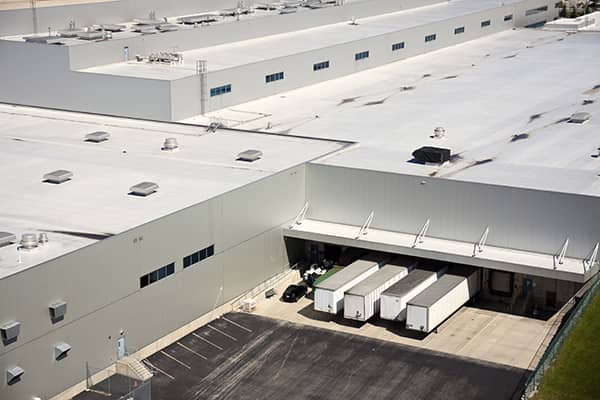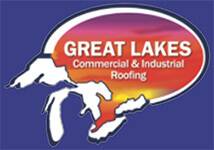Types of Roof Coatings
We’ll Help You Select the Right Option for Your Commercial Roof
No matter the age of a commercial roofing system, a roof coating can extend its overall life. Coatings can fill in any small holes, reducing the chances of leaks, and reflective properties can increase energy efficiency. Great Lakes Commercial & Industrial Roofing can install a variety of different roof coatings. While we recommend an acrylic, liquid rubber or silicone coating, there are many others on the market as well.

Common Roof Coatings
Great Lakes Commercial & Industrial Roofing can quickly and affordably add a roof coating to your system. Your choices for coatings include:
- SEBS/Thermoplastics. This coating is great for commercial roofs with some slope to it. This coating can not be used in ponding water situations but on roofs with slope they provide superior tensile strength along with encapsulating the entire roof. This coating is also great for metal roofs as it has rust inhibiting qualities.
- Silicone. A silicone coating is the only coating that can be used on a roof with ponding water issues. The silicone coating encapsulates the entire roof and eliminates all of the vulnerable areas of the roof system such as roof membrane seams and penetrations.
- Rubberized Aluminum. Rubberized aluminum coatings are extremely reflective and water proofing. This system is used with modified bitumen and asphalt based roofs. This coating is the most budget friendly coating option.
Commercial & Industrial Roof Coating Qualities
Roof coatings are not used to fix existing leaks. All leaks must be fixed before any coating is to be applied. The optimal time to apply a roof coating is at the first sign your existing roof system is showing wear and tear.
PHYSICAL PROPERTIES TO CONSIDER IN ELASTOMERIC ROOF COATING PURCHASES
- Elasticity/Elongation: Elasticity is the ability of a material to stretch. The ability to stretch and also recover means that a roof coating can move with the expansion and contraction of the roof as the temperature changes without cracking. Remember, only products which recover after being challenged are ready to take on the next needs. Bubblegum for example has tremendous elasticity. But because it has no recovery, stretching it only makes it thinner and ultimately a mess. The higher the elasticity, the more likely the product will endure your needs and fluctuations in the roof structure. When you couple this with recovery you get a product which can keep on performing for your needs.
- Tensile Strength (new): Tensile strength measures the ability of the product to hold together and avoid breaking. Roof coating companies typically only report tensile strength when the product is new and in the lab. Spoiler: It always changes once outside exposure and aging begins.
- Tensile Strength (aged): The tensile strength of a roof coating can deteriorate rapidly over time with exposure to the weather. We highly recommend that you select a manufacturer that can provide you with written, third-party tensile strength measurements of their coatings when they are aged and have been exposed to the elements. It provides you an added level of comparison. The aged measurements of the best roof coatings often beat those of competitors’ new product measurements. That signifies a serious difference in coating quality and value over time.
- Perm Factor: The perm factor is the coating’s resistance to moisture vapor passing through it. A lower number shows less moisture can pass through it.
- Moisture Gain by Weight: Moisture gain by weight measures the coating’s ability to absorb water vs repel water and protect the roof beneath. You want a roof coating that repels water away from the roof, rather than absorbing it into the roofing material which can accelerate aging and deterioration of the roof itself.
- Peel Adhesion: Peel adhesion measures the ability of the coating system to remain adhered to the roof surface under adverse conditions. If your roof coating doesn’t stay firmly attached, then it can’t properly protect your roof.
- Tear Resistance: The tear resistance of a coating is, just as it sounds, the resistance to tearing which can happen due to foot traffic, from roof movement, or from other shifts in the environment.
- Reflectivity: Reflectivity measures how much solar heat is reflected away from the roof by the coating. A cool, reflective roof surface allows all building components to work more efficiently and reduces maintenance needs and premature roof failure caused by UV damage and thermal shock.
Schedule a Free Quote Today
Great Lakes Commercial & Industrial Roofing can help you select the right coating for your roof, based on your needs and budget. Schedule a free quote today by calling our team at (877) 938-9318 or by filling out our online form.
